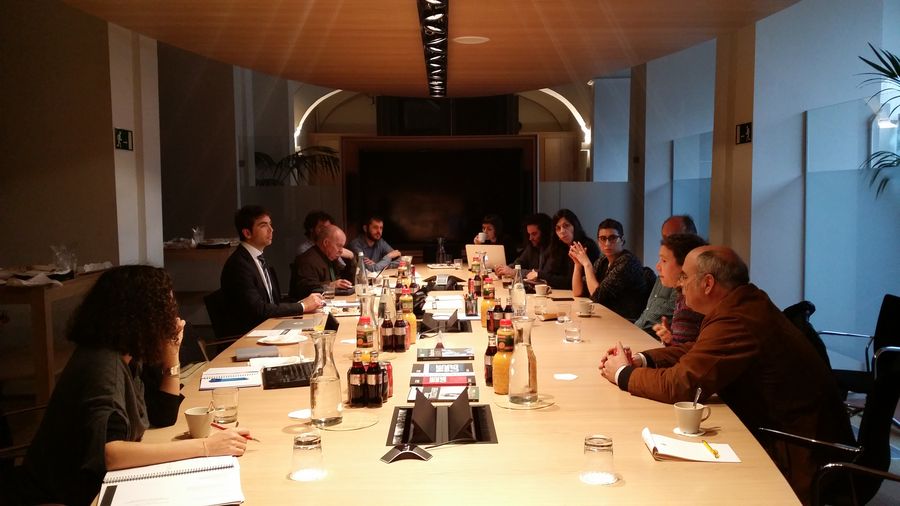New transparency law, criticised as failing to meet international standards, took effect yesterday
Vienna, 11 December 2014 – Spanish civil society must speak out to counter diverse challenges to freedom of expression, the International Press Institute (IPI) said today following a four-day international mission to Madrid and Barcelona.
Participants in the mission concluded that a lack of coordinated monitoring and advocacy has hindered efforts to enhance the free flow of information necessary for the strongest possible functioning of Spanish democracy, nearly 40 years after its advent.
Led by IPI, the visit – the first of its kind to Spain – included representatives from the European Federation of Journalists (EFJ), Reporters without Borders (RSF), the Committee to Protect Journalists (CPJ), the Open Society Foundations (OSF) and Access Info Europe (AIE). It sought to gauge the level of press freedom, freedom of expression and the right of access to information in a country that has been rocked by the global financial crisis and a series of corruption scandals.
Amid such a backdrop, the delegation observed an alarming degree of mistrust by the public in Spain’s public media, widely perceived as being insufficiently independent. Interlocutors, including members of an internal advisory council for Spanish public television made up of journalists (Consejo de informativos), suggested that the current nominating process for key management positions and a lack of guarantees to ensure that editorial positions are filled on the basis of professional criteria rather than political affiliation enshrined government influence over content. Council members called the delegation’s attention to specific examples of what the members interpreted to be direct censorship.
Mission participants were disappointed when representatives of the governing board of Spanish public broadcasting (Corporación RTVE) indicated during a meeting that they were unable or unprepared to discuss media freedom issues. The representatives said that they were pleased to welcome the delegation to RTVE, but that they had not understood the meeting would include questions about media freedom – despite the fact that this was clearly stated in the delegation’s invitation letter – and could not “improvise” answers. It was not clear what the representatives had planned to discuss instead.
The delegation welcomed the opportunity to meet with Secretary of State for Communication Carmen Martínez Castro, who expressed her openness to reviewing documentation detailing the delegation’s concerns, including suggestions on how to promote independence in audiovisual regulation, the implementation of the country’s recently passed right to information law, criminal and civil laws regulating defamation and libel, a lack of transparency in the allocation of institutional advertising, and other concerns expressed by the delegation.
“We are encouraged by the willingness of the Spanish central government to consider our viewpoint on how guarantees for press freedom in Spain can be further enhanced,” IPI Deputy Director Barbara Trionfi, who headed the mission, said this week. “We look forward to providing information on international standards and best practices on a number of key issues, including public media governance, audiovisual regulation and the decriminalisation of defamation, with a view toward encouraging their implementation.”
But she added: “What is essential to sustainable press freedom advocacy in Spain is a stronger national civil society that can document press freedom violations and raise awareness as to why they matter. In turn, the Spanish government must be willing to consider input provided by relevant sectors of civil society and other stakeholders as a core element of the legislative process.” Accordingly, Trionfi said she welcomed last week’s launch of the Platform for the Defence of Freedom of Expression (Plataforma en Defensa de la Libertad de Información), a new coalition uniting a diverse group of lawyers, prosecutors, media representatives, academics and consumer advocates.
The international delegation encountered widespread scepticism toward Spain’s Law on Transparency, Access to Information and Good Government, which took effect yesterday, Dec. 10. Several civil society organisations and media representatives have argued that the law fails to enshrine European and international standards.
Defending the law, Martínez Castro pointed out that no previous transparency legislation existed in Spain and that the text incorporated the suggestions of parliamentary working groups. “We have the will to see that Separately, Martínez Castro denied a reported trend whereby Spanish government officials, including Prime Minister Mariano Rajoy, have refused to allow questions at press conferences. Virtually all media outlets with which the delegation met, however, testified that such a trend exists and they highlighted it as indicative of a lack of governmental transparency. The delegation encountered near-universal consensus that the economic crisis affecting the media posed one of the most formidable threats to the Spanish public’s right to information. “While the traditional media landscape in Spain remains strong and continues to dominate the market amid a huge digital transformation effort, the ongoing financial and, occasionally, credibility crisis of traditional media on the one hand and public media on the other has given space to the proliferation of new forms of journalism to fulfil the expectation of important sectors of society. This provides clear evidence that journalism in Spain is reinventing itself in order to be able to fulfil its function in a democratic society,” Trionfi said. A full report on the mission’s findings will be published in the coming weeks. The mission came shortly after nine civil society organisations, including IPI, sent a letter to the UN Human Rights Committee expressing concern over the situation of freedom of expression in Spain. Helen Darbishire | Access Info Europe Victoria Anderica | Access Info EuropeFor more information, please contact:
helen@access-info.org +34 607 685 319
victoria@access-info.org +34 913 656 558

